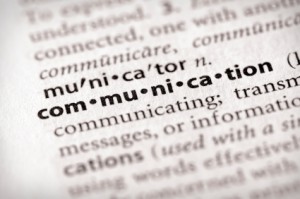Too often the PR profession is defined by what it’s not: as in …not advertising …not marketing …not (just) publicity.
But it doesn’t address the most important issue: WHO WE ARE.
We’ve all experienced it; many people don’t understand what PR does. To some, we’re shadowy figures, pulling strings, spinmeistering, whispering – the darkest side of our industry and the one most often represented in movies because it makes for good drama. And while those things do happen – probably more than they should – it’s a representation of a small part of the profession.
Well, it’s time for PR to step out of the wings. In our social age of transparency and openness, a viable definition of PR is more essential than ever.
The Canadian Public Relations Society tackled this a few years back. Terry Flynn, one of the authors of the Canadian definition, even set up a wiki, which included many past definitions, as he worked through the process. And while I like the Canadian result, I don't feel it addresses our role in social media.
So I was happy to hear that PRSA, along with several other industry organizations, announce they’re crowdsourcing a definition of PR. Sure, the format is a bit simplistic – fill in the blanks – but at least the conversation is happening… in public. You can follow a discussion on Twitter by using the hashtag #PRDefined.
I think this is great.
But before we leap into our defining moment, let’s start by examining our name. Rather than calling it public relations – let's change it to public relationships. Because, that’s what good PR does; create and maintain public relationships between organizations – that is the people who work for organizations – and the people on the other side who are interested and have a stake in it.
I’d also hope the definition makes reference two-way social and traditional communications, ethics, transparency and trust.
As Jeff Jarvis said when he spoke at Third Tuesday Toronto, we live in a world of ‘publicness’ which 'allows us to connect to each other, to information, to actions and to transactions. Links help us organize new societies and redefine our publics.'
In that context, a profession that understands and facilitates public relationships and conversations is more relevant than ever.
I’m interested to see how the process evolves and what we come up with.
I’m sure when the final result is released, there will be some controversy and not everyone will be pleased.
My hope is the definition is written in plain English, embraces our changing reality and once and for all answers that eternal question about PR: So what is it exactly that you do?
What's your take?


Interesting post, Martin! With social media redefining communications the way it has and one-to-one communications becoming as important as one-to-many communications in some cases, maybe the first word should also be under evaluation. Isn't it sometimes personal or private relations/relationships? Perhaps we need to change it to RR… relationship relations. 🙂 Or we can just ask Abbie Fink's mom what PR people do. She explains it in plain English better than anyone I know!
I'm with you Martin. When asked, I say, "we help our clients build beneficial relationships with the people that their success depends upon."
Thanks Sherrilynne – I like that – it's straight to the point and easy to understand.
I like it, too. Straight, to the point, and no gobbledygook.